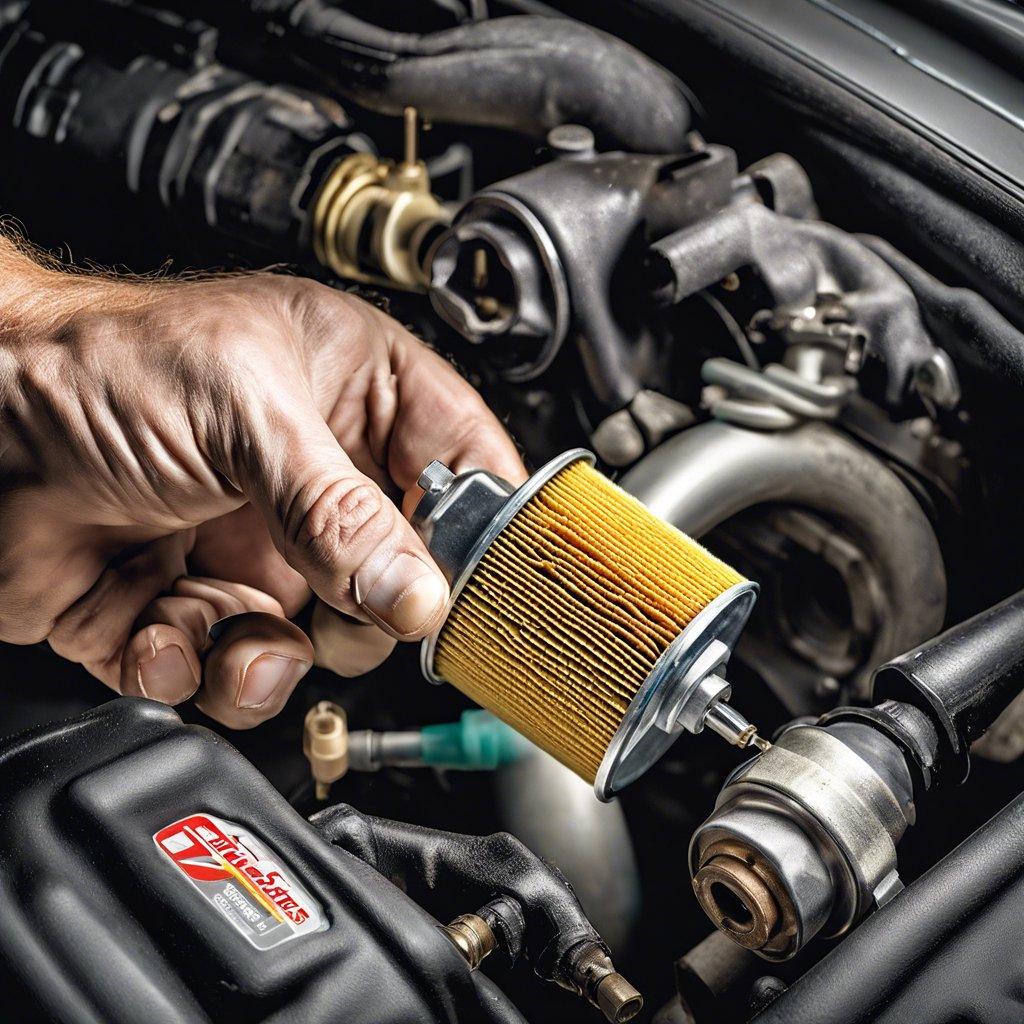Unclogging Your Fuel Filter: Effective Solutions
Clearing the Blockage: Unclogging Your Fuel Filter with Precision

Understanding the Importance of Fuel Filters
Fuel filters play a crucial role in maintaining the efficiency and longevity of your vehicle’s engine. They are designed to remove contaminants, such as dirt, rust, and other impurities, from the fuel before it reaches the engine. A clogged fuel filter can lead to a range of issues, including reduced fuel flow, decreased engine performance, and even engine damage.
Diagnosing a Clogged Fuel Filter
Identifying a clogged fuel filter can be a straightforward process. Some common signs include:
- Reduced engine power or performance
- Difficulty starting the engine
- Decreased fuel efficiency
- Stalling or hesitation during acceleration
Unclogging the Fuel Filter: Step-by-Step Guide
Unclogging a fuel filter can be a simple and effective solution to restore your vehicle’s performance. Follow these steps to clear the blockage:
- Locate the fuel filter, which is typically positioned between the fuel tank and the engine.
- Disconnect the fuel lines from the filter, taking care to avoid spills.
- Remove the fuel filter from the system.
- Inspect the filter visually to assess the level of clogging. If the filter appears heavily obstructed, it may need to be replaced.
- If the filter is only partially clogged, attempt to unclog it by flushing it with a fuel system cleaner or compressed air.
- Reinstall the filter, ensuring a secure connection, and reconnect the fuel lines.
- Start the engine and check for any leaks or remaining performance issues.
Fuel Filter Maintenance and Prevention
| Maintenance Interval | Recommended Action |
|---|---|
| Every 12,000 miles or 12 months | Replace the fuel filter |
| Every 6,000 miles or 6 months | Inspect the fuel filter for signs of clogging |
By following a regular maintenance schedule and addressing any fuel filter issues promptly, you can help ensure the optimal performance and longevity of your vehicle’s engine.
Fuel Flow Restoration: Effective Techniques to Revive Your Filter
Understanding Fuel Filter Clogging
Fuel filters play a crucial role in maintaining the health of your vehicle’s engine by removing impurities and contaminants from the fuel. Over time, these filters can become clogged, restricting the flow of fuel and leading to various performance issues. Recognizing the signs of a clogged fuel filter and addressing the problem promptly is essential for optimal engine performance and fuel efficiency.
Identifying Clogged Fuel Filter Symptoms
The first step in unclogging your fuel filter is to identify the symptoms of a blockage. Common signs include:
- Decreased engine power: A clogged fuel filter can restrict the flow of fuel, leading to a noticeable loss of power and acceleration.
- Difficulty starting the engine: A clogged filter can make it harder for the engine to start, especially in cold weather.
- Reduced fuel efficiency: As the filter becomes more restricted, the engine has to work harder to draw fuel, resulting in decreased fuel economy.
- Irregular engine idling: A clogged filter can cause the engine to run rough or idle erratically.
Effective Techniques for Fuel Filter Unclogging
If you suspect a clogged fuel filter, it’s essential to address the issue promptly. Here are some effective techniques to revive your filter and restore fuel flow:
| Technique | Description |
|---|---|
| Filter Replacement | The most reliable solution is to replace the fuel filter altogether. This ensures the removal of any accumulated debris and the restoration of optimal fuel flow. |
| Fuel System Cleaning | Using a fuel system cleaner can help dissolve and flush out any buildup in the filter and fuel lines, improving fuel flow and engine performance. |
| Pressure Differential Testing | Measuring the pressure differential across the fuel filter can help identify the extent of the blockage and guide the appropriate course of action. |
By understanding the signs of a clogged fuel filter and implementing effective techniques, you can restore fuel flow and maintain optimal engine performance. Regular maintenance and prompt attention to any fuel system issues can help extend the life of your vehicle and ensure a smooth, efficient driving experience.
Optimizing Fuel Efficiency: Unlocking the Power of a Clean Filter
Understanding the Importance of a Clean Fuel Filter
The fuel filter in your vehicle plays a crucial role in maintaining optimal fuel efficiency. As the name suggests, it filters out impurities and contaminants from the fuel, ensuring a clean supply to the engine. A clogged or dirty fuel filter can significantly impact your vehicle’s performance, leading to decreased power, reduced fuel economy, and even potential engine damage.
Identifying the Signs of a Clogged Fuel Filter
Recognizing the early signs of a clogged fuel filter can help you address the issue before it becomes a major problem. Some common symptoms include:
- Decreased Fuel Efficiency: If you notice a sudden drop in your vehicle’s fuel economy, it could be a sign of a clogged fuel filter.
- Difficulty Starting the Engine: A clogged filter can restrict fuel flow, making it harder for the engine to start.
- Stalling or Hesitation: A clogged filter can cause the engine to stall or experience hesitation during acceleration.
Effective Solutions for Unclogging Your Fuel Filter
Addressing a clogged fuel filter is essential for maintaining your vehicle’s performance and fuel efficiency. Here are some effective solutions:
| Solution | Description |
|---|---|
| Fuel Filter Replacement | Replacing the fuel filter is the most direct solution to address a clogged filter. Follow the manufacturer’s recommended replacement intervals to ensure optimal fuel flow. |
| Fuel System Cleaning | Using a fuel system cleaner can help dissolve and remove built-up deposits, improving fuel flow and engine performance. |
| Fuel Line Inspection | Inspect the fuel lines for any blockages or restrictions that could be contributing to the clogged fuel filter. |
Maintaining a Clean Fuel Filter for Long-Term Fuel Efficiency
Regularly maintaining a clean fuel filter is essential for optimizing your vehicle’s fuel efficiency and overall performance. Follow the manufacturer’s recommended maintenance schedule and consider the following tips:
- Replace the fuel filter at the recommended intervals to prevent buildup of contaminants.
- Use high-quality fuel and fuel additives to help keep the fuel system clean.
- Inspect the fuel lines and connections for any signs of wear or damage that could lead to a clogged filter.
By understanding the importance of a clean fuel filter and implementing effective solutions, you can unlock the power of your vehicle’s fuel efficiency and enjoy a smooth, responsive driving experience.
Fuel System Rejuvenation: Mastering the Art of Fuel Filter Maintenance
Understanding the Importance of Fuel Filter Maintenance
Maintaining the fuel filter in your vehicle is a crucial aspect of ensuring optimal engine performance and longevity. The fuel filter plays a vital role in trapping contaminants and impurities that can accumulate in the fuel system, preventing them from reaching the engine and causing damage. Neglecting fuel filter maintenance can lead to a range of issues, including reduced fuel efficiency, decreased power, and even engine failure.
A clogged fuel filter can manifest itself in various ways, and it’s important to be aware of the telltale signs to address the issue promptly. Some common indicators of a clogged fuel filter include:
- Decreased fuel efficiency: If your vehicle’s fuel economy has noticeably declined, it could be a sign that the fuel filter is obstructed, reducing the flow of fuel to the engine.
- Hesitation or stalling during acceleration: A clogged fuel filter can restrict the fuel supply, causing the engine to hesitate or stall when you press the accelerator.
- Difficulty starting the engine: A clogged fuel filter can make it harder for the engine to start, especially when the vehicle has been sitting for an extended period.
Unclogging Your Fuel Filter: Step-by-Step Guide
If you suspect that your fuel filter is clogged, it’s essential to take prompt action to restore the fuel system’s efficiency. Here’s a step-by-step guide to unclogging your fuel filter:
- Locate the fuel filter: Consult your vehicle’s owner’s manual or service manual to determine the location of the fuel filter, as its position can vary depending on the make and model.
- Disconnect the fuel lines: Carefully disconnect the fuel lines from the filter, taking precautions to avoid fuel spills or leaks.
- Remove the fuel filter: Unscrew or detach the fuel filter from its mounting, ensuring that you have the necessary tools and workspace to work on the task safely.
- Clean or replace the fuel filter: If the filter is simply clogged, you may be able to clean it using a suitable cleaning solution. However, if the filter is severely contaminated or damaged, it’s best to replace it with a new one.
- Reinstall the fuel filter: Carefully reattach the fuel lines and secure the filter back in its original position, ensuring a tight and secure connection.
- Start the engine and check for leaks: Turn on the ignition and start the engine, closely monitoring for any fuel leaks or other issues. If everything appears to be functioning correctly, you’ve successfully unclogged your fuel filter.
Maintaining a Healthy Fuel System
To keep your vehicle’s fuel system in optimal condition, it’s important to follow the manufacturer’s recommended maintenance schedule for fuel filter replacements. Additionally, consider the following tips for maintaining a healthy fuel system:
| Maintenance Task | Frequency |
|---|---|
| Fuel filter replacement | Every 30,000 to 50,000 miles or as per manufacturer’s recommendations |
| Fuel system cleaning | Every 12-24 months or as needed |
| Fuel additive use | As per manufacturer’s recommendations or as needed to maintain fuel system health |
By following these best practices and staying vigilant about fuel filter maintenance, you can ensure that your vehicle’s fuel system remains in optimal condition, maximizing performance, fuel efficiency, and engine longevity.




Post Comment